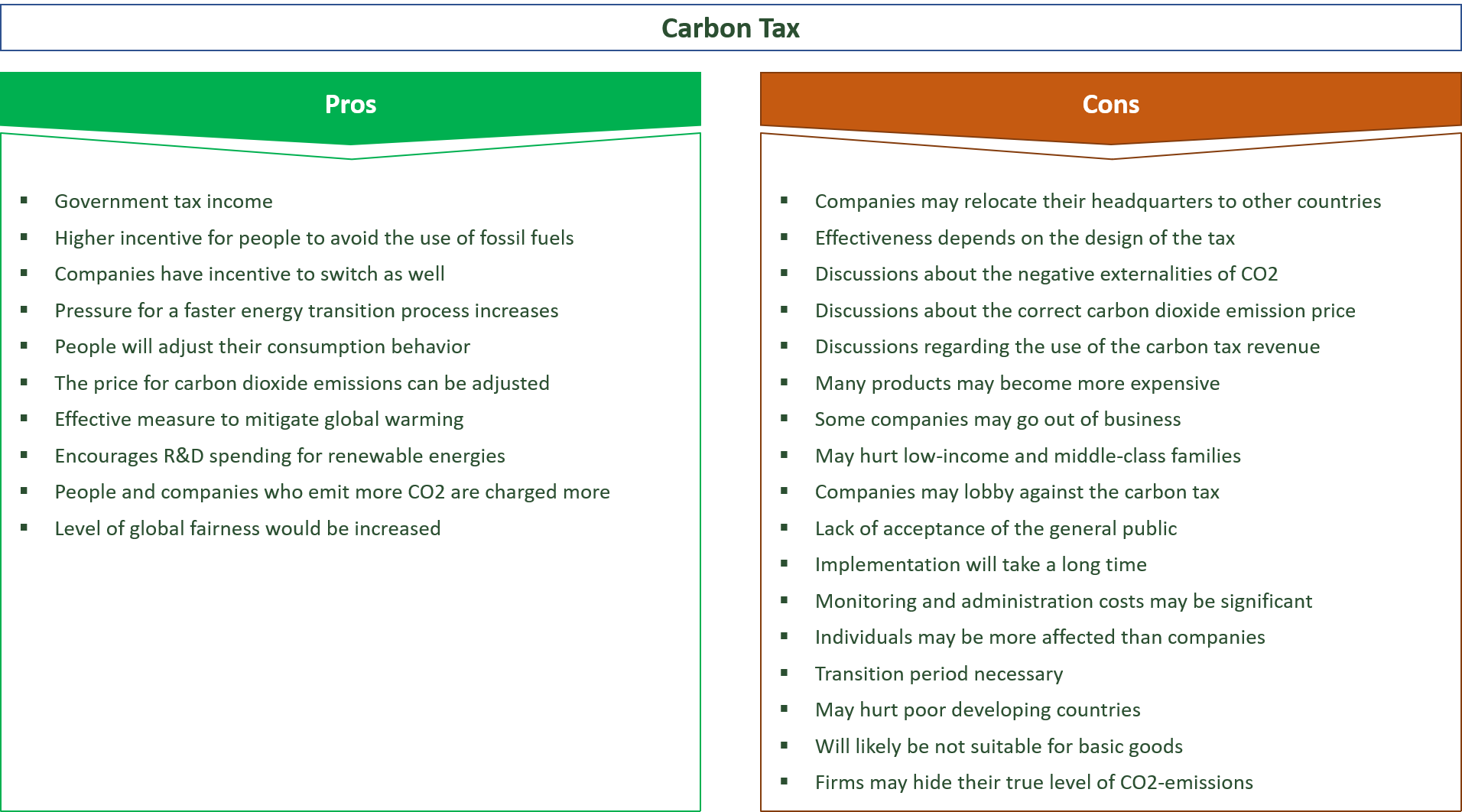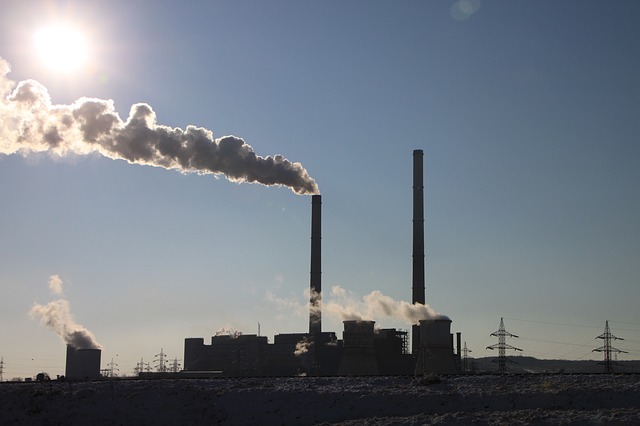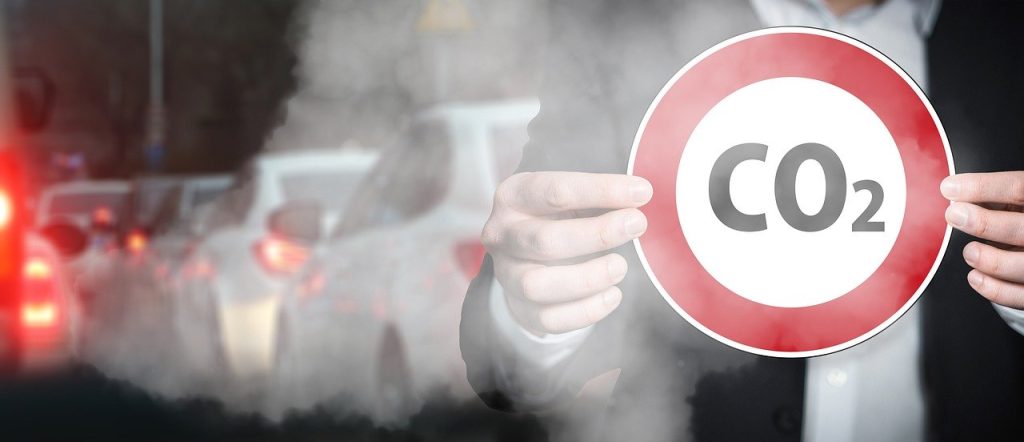“I’m anti-tax, but I’m pro-carbon tax.”
Elon Musk, Businessman
Advantages & Disadvantages of Carbon Taxes

The carbon tax can be regarded as the price for one unit of carbon that is emitted into our atmosphere.
It is a form of carbon pricing and aims to reduce global carbon emissions in order to mitigate the global warming issue.
Although the carbon tax has some important advantages, it also implies some problems.
In this article, the pros, cons and alternatives of carbon taxes are examined.
Audio Lesson
Contents
Advantages of the Carbon Tax
- Higher tax income
- Higher incentive for people to avoid the use of fossil fuels
- Companies have an incentive to go green as well
- Pressure for a faster energy transition process increases
- People will adjust their consumption behavior
- The price of carbon dioxide emissions can be adjusted
- Effective measure to mitigate global warming
- Encourages R&D spending for renewable energies
- People and companies who emit more CO2 are charged more
- Level of global fairness would be increased
Higher tax income
By introducing a carbon tax, the overall tax revenue of governments could be significantly increased.
This money could be used to reduce government debt or also for subsidies for green energies and technologies.
Thus, through a carbon tax, there will be plenty of additional money to support different kinds of government projects.
Higher incentive for people to avoid the use of fossil fuels
Another advantage of the carbon tax is that households have an incentive to switch from fossil fuels to renewable resources.
Even if they did not care about our environment at all, people would still have the incentive to buy more eco-friendly products from an economic perspective since they could save large sums of money in the long run due to that.
Therefore, homeowners may decide to switch from oil heating to the use of solar heating instead.
There are several additional options for how private persons could reduce their use of fossil fuels at home.
If the carbon tax is high enough, it will be profitable for homeowners to switch to green energies, which would significantly improve their ecological footprint and help our environment.
Companies have an incentive to go green as well
Not only private households would have a significant financial incentive to switch to green energies, also industries would be forced to adapt to the new circumstances since the marginal costs of every unit of carbon emitted into the atmosphere would increase.
Thus, firms would have a bigger incentive to refrain from using fossil fuels and to transit to renewable energy sources instead.
Therefore, through the introduction of a carbon tax, greenhouse gas emissions could be significantly reduced and the global warming process could be mitigated to a certain extent.
Pressure for a faster energy transition process increases
In general, the pressure for a faster energy transition from fossil to renewable energies would increase on a global scale, both for companies as well as for private households.
The competition in the renewable energy sector would become fiercer since more companies would decide to engage in this market.
Higher competition most often leads to lower prices which benefits the general public since they can afford more material things for their money.
People will adjust their consumption behavior
People will also think twice when it comes to buying new stuff that had been made out of fossil resources since the prices for those items would likely increase.
Therefore, people may rely on things that had been made with the help of renewable resources instead.
Therefore, a carbon tax may improve the ecological footprint of many people.
The price of carbon dioxide emissions can be adjusted
Depending on the carbon dioxide reduction that is needed on a global scale, governments around the world could adjust their carbon price in order to reach their emission goals.
For instance, let’s assume that the carbon tax had been set to a certain price x. If there is still too much carbon emissions, the government could decide to raise the tax to a price x+1.
After that, the government could re-evaluate the price and make further adjustments.
Over time, the government could find the optimal carbon price to reach a specific emission goal.
Effective measure to mitigate global warming
Since governments have control over the price of carbon emissions, a carbon tax could be a valid measure in order to slow down global warming and the resulting adverse effects.
We as humanity, especially in our rich Western world, have a great responsibility to protect the poorest among us.
Therefore, we should all make our contribution in order to mitigate global warming since the effects would mostly hurt the poorest people on our planet the most, even if this would imply a financial burden due to increasing prices for many goods.
Encourages R&D spending for renewable energies
A carbon tax would also encourage companies as well as governments around the world to increase their spending in research and development for renewable energies.
Since the marginal costs for greenhouse gas emissions increase due to a carbon tax, countries as well as firms have a great incentive to transit to renewable energies and might also be more willing to spend large sums of money in this area.
People and companies who emit more CO2 are charged more
The intuition behind a carbon tax is fairly simple.
Everyone who is responsible for the emission of carbon will be charged for it.
Everyone who avoids the emission of carbon will financially benefit since the amount of money they have to spend on carbon taxes would be lower.
Most people would agree that this principle makes quite a lot of sense and should be implemented from an objective standpoint.
Level of global fairness would be increased
Since poor developing countries that do not emit too much carbon will suffer from climate change the most while most industrialized countries with high levels of greenhouse gas emissions will not suffer too much, it should be obvious that this could not be in line with the concept of global fairness.
In order to mitigate the horrible effects of global warming on the poorest among us, a global carbon tax would be quite intuitive and could be an effective measure to increase global fairness to a certain extent.

Disadvantages of the Carbon Tax
- Companies may relocate their headquarters to other countries
- Effectiveness depends on the design of the tax
- Discussions about the negative externalities of CO2
- Discussions about the correct carbon dioxide emission price
- Discussions regarding the use of the carbon tax revenue
- Many products may become more expensive
- Some companies may go out of business
- May hurt low-income and middle-class families
- Companies may lobby against the carbon tax
- Lack of acceptance of the general public
- Implementation will take a long time
- Monitoring and administration costs may be significant
- Individuals may be more affected than companies
- Transition period necessary
- May hurt poor developing countries
- Will likely not be suitable for basic goods
- Firms may hide their true level of CO2-emissions
Companies may relocate their headquarters to other countries
One problem of the introduction of carbon taxes is that some companies may relocate to tax havens where they do not have to pay any carbon tax at all.
This could be a quite big issue since companies usually try to avoid paying taxes and they may be able to find loopholes in the global tax system.
Thus, countries all over the world have to work together and set similar carbon tax standards in order to prevent firms to relocate to tax havens and to avoid carbon tax payments.
Effectiveness depends on the design of the tax
It is also sometimes quite difficult to design a tax code which gives firms as well as private persons the incentive to reduce their carbon emissions.
Thus, industry experts are needed to design and adjust regulatory frameworks in order to make the tax compliant with the national laws and also to avoid any loopholes in the system.
However, those experts are usually quite expensive and have to be financed through taxpayer money.
Discussions about the negative externalities of CO2
On a global scale, it is also quite hard to find a consensus regarding the real negative impact of carbon dioxide emissions on our environment and how big its impact is in speeding up global warming.
Depending on the country, there might even be politicians claiming that carbon dioxide would not have any effect on global warming at all.
Thus, there will be plenty of discussions regarding whether a global carbon tax makes sense or not.
Discussions about the correct carbon dioxide emission price
Even if a global consensus regarding the introduction of carbon taxes will be found, there will be another big issue related to the setting of carbon prices.
Since some countries are much more dependent on the use of fossil fuels than others, there will be a huge discrepancy regarding the price countries would want to charge for every unit of carbon emitted into our atmosphere.
It will be almost impossible to agree to a global carbon price since there is simply too much difference in the economies and political systems in countries all over the world.
Discussions regarding the use of the carbon tax revenue
Another issue of carbon taxes is that there would be plenty of discussions for what the additional tax revenue would be used for.
Government projects are often quite inefficient and plenty of money is burned each year on failing projects.
Thus, there is room for discussions of whether the additional tax revenue would really benefit the general public or not.
Many products may become more expensive
Products that are made with the help of fossil fuels might also become more expensive due to a carbon tax since production costs increase and companies may decide to raise the prices for their products due to that.
Thus, this could mean that people may have to spend more money to maintain their current lifestyle, which may lead to protests of the general public against those taxes.
Some companies may go out of business
Some industries are still heavily dependent on fossil fuels as their primary energy source.
Companies in those industries may have a quite hard time due to the introduction of carbon taxes since their production costs may skyrocket and they might lose their competitive edge to companies who rely on alternative energies instead.
Therefore, some companies may go out of business and some jobs may be lost due to the introduction of carbon taxes.
May hurt low-income and middle-class families
The introduction of carbon taxes may also hurt low-income and middle-class families the most.
For instance, if many goods for daily life become more expensive, people who only have low levels of money will suffer the most since they might not be able to substitute those basic goods.
People with a good salary may be less vulnerable to increases in prices for basic goods since they only spend a small share of their overall income on those goods and they will easily be able to pay a little bit more for this product class.
Thus, the carbon tax may hurt the poorest among us much more than the financial elite, which could be regarded to be socially unfair.
Companies may lobby against the carbon tax
The decisions of politicians are greatly affected by lobbyists from big companies.
Many laws had been modified in order to favor big companies on a global scale.
The same could be true when it comes to the design of carbon taxes. In the end, there may be enough loopholes for big companies for tax avoidance and only the general public may be charged.
Lack of acceptance of the general public
Many people may also not accept the introduction of such a carbon tax.
This may be especially true for people who heavily rely on fossil fuels to power their homes or also for people who work in the fossil energy sector.
Thus, especially in countries which rely on fossil fuels as primary energy source, it may be hard for politicians to introduce a carbon tax since politicians may fear to be voted out of office.
Implementation will take a long time
Since there will be plenty of discussions regarding the optimal price of carbon emissions, it will take a pretty long time on a national as well as on an international level to set a framework for the introduction of carbon taxes.
In fact, it will be hard to agree to carbon taxes on a global scale at all.
Thus, it could take many years or even decades to make progress regarding this topic.
Monitoring and administration costs may be significant
There will also be significant administration costs regarding carbon taxes.
A high number of people are needed to collect and to monitor companies in order to assure that they pay their carbon tax in a legally compliant manner.
Thus, part of the additional tax income from the introduction of a carbon tax will be lost due to administrative costs.
Individuals may be more affected than companies
Since companies often find loopholes in tax codes since they are able to afford the best tax avoidance consulting firms, individuals may have to suffer the most from the introduction of carbon taxes.
This may lead to plenty of discussions among the general public since people may feel to be treated in an unfair manner.
Transition period necessary
In order to adapt to the new tax codes, companies and also private persons would need a certain period of time in order to figure out how to change their production and consumption behavior.
Consequently, the positive effects of carbon taxes would take a while to unfold.
May hurt poor developing countries
A global carbon tax may also hurt poor developing countries.
While rich industrialized countries have plenty of financial resources to transit to renewable energies in a rather short period of time, poor countries do not have those opportunities.
Thus, poor countries may in fact be hit the hardest by the introduction of carbon taxes since many of them still have to rely on fossil fuels for a quite long time due to financial constraints.
Will likely not be suitable for basic goods
Since certain goods are quite price-inelastic, people would not switch to alternative goods even if a carbon tax was introduced for those products.
For instance, a poor family driving an old car operated by gas would not buy a new electric model, even if the gas prices increased since they would simply not be able to financially afford the purchase of an electric car.
Hence, carbon taxes might not be suitable for some price-inelastic goods.
Firms may hide their true level of CO2-emissions
In some countries where corruption is a big problem, companies may also try to disguise their actual carbon emissions in order to pay lower taxes.
Thus, the tax revenue from carbon taxes might be far lower in some countries than expected due to those corruptive activities.

Carbon Tax Alternatives
- Subsidize renewable energies
- Abandon subsidies for fossil fuels
- Encourage people to use public transport
- Government spending in R&D regarding green energies
- Teleworking to avoid commuting
- Global carbon emission certificates
- Complete abandonment of fossil fuels
- Raise the awareness of the general public
Subsidize renewable energies
Apart from the introduction of carbon taxes, there are also some alternatives.
For instance, governments could significantly subsidize the expansion of renewable energies.
In many countries around the world, this is already done and the energy transition progresses at a fast pace.
If those subsidies are high enough, there might be no need to introduce a carbon tax since the incentive for firms would be high enough due to those subsidies even without carbon taxes.
Abandon subsidies for fossil fuels
In some countries, there are still subsidies for companies that rely on fossil fuels.
It should be obvious that these kinds of subsidies will not be in line with the protection of our environment at all.
Thus, subsidies related to the use of fossil fuels should be abandoned immediately and renewable energies should be subsidized instead in order to fight global warming and the horrible effects associated with it.
Encourage people to use public transport
Since public transport is much more eco-friendly compared to the use of cars, more people should refrain from using their cars and go for public transport instead.
Especially in cities with a good public transport system, people should not be too dependent on their cars.
The government could further encourage people to use public transport systems by giving away public transport tickets for free.
By doing so, more people would use public transport and the emission of greenhouse gases related to the use of cars could be reduced.
Government spending in R&D regarding green energies
Governments also have to make sure that they provide research institutions with enough financial measures to drive the transition from fossil to renewable energies.
Only then will we be able to achieve the technological progress we need on a global scale to fully transit to renewable energies in time in order to slow down global warming.
Teleworking to avoid commuting
Firms could also allow their employees to work from home whenever possible in order to avoid greenhouse gas emissions related to commuting.
Especially for office jobs, it is often not needed that employees are physically present in the office since communication with virtual programs will often be sufficient.
Global carbon emission certificates
Another alternative to carbon taxes would be to emit carbon certificates.
Similar to carbon taxes, carbon certificates are another form of carbon pricing.
However, the price for those certificates can change over time since those certificates can be traded.
By allowing this trading, companies who urgently need those certificates will pay the highest prices, which can be considered to be optimal and fair from a social perspective since those who are responsible for the most carbon emissions have to pay the highest price for it.
Complete abandonment of fossil fuels
Another measure in order to fight carbon emissions would be to completely abandon fossil fuels over time.
Even though this might sound like a simple and effective measure in theory, it would likely not be practical on a global scale since too many countries would not accept such radical measures.
Raise the awareness of the general public
Finally, it is also crucial to raise the awareness of the general public on the global warming issue and to show them how changes in their consumption behavior can help to slow down the global warming process.
By doing so, people may be more eager to adjust their consumption behavior in a more eco-friendly manner.

Top 10 Carbon Tax Pros & Cons – Summary List
| Carbon Tax Pros | Carbon Tax Cons |
|---|---|
| Additional tax income | Companies may relocate to other countries |
| Incentive to avoid fossil fuels | Effectiveness depends on tax design |
| Companies may switch to green energies | Discussion about carbon price |
| Pressure for faster energy transition process | Companies may go out of business |
| Adjustments in consumption behavior | Implementation may take a long time |
| Price control over carbon tax | May hurt poor people |
| Fighting global warming | Products may become more expensive |
| Higher R&D spending for renewable energies | Transition period necessary |
| Higher carbon emissions = higher taxes | Lobbying might lead to loopholes |
| Increase in global fairness | May not work for price-inelastic goods |
Conclusion
Introducing a carbon tax could be an efficient way to reduce our global greenhouse gas emissions and to slow down global warming.
Even though carbon taxes have many important advantages, there are also some issues related to them.
Thus, there might also be suitable alternatives that might yield better results compared to carbon taxes.
Sources
https://en.wikipedia.org/wiki/Carbon_tax
https://www.worldbank.org/en/programs/pricing-carbon

About the author
My name is Andreas and my mission is to educate people of all ages about our environmental problems and how everyone can make a contribution to mitigate these issues.
As I went to university and got my Master’s degree in Economics, I did plenty of research in the field of Development Economics.
After finishing university, I traveled around the world. From this time on, I wanted to make a contribution to ensure a livable future for the next generations in every part of our beautiful planet.
Wanna make a contribution to save our environment? Share it!
